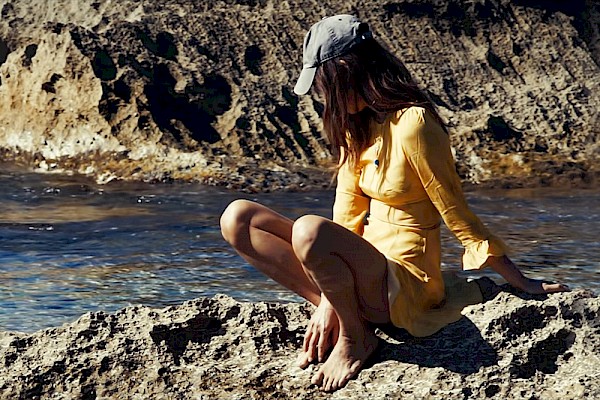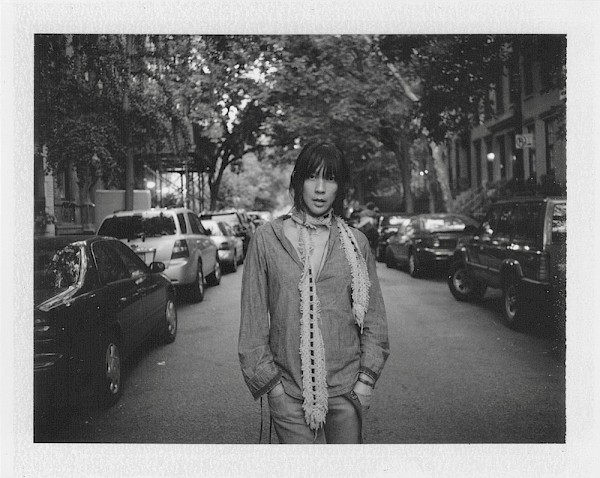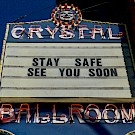 Two years ago, Kazu Makino left her home in New York. It was where she’d lived since the early '90s and where she met twin brothers Simone and Amedeo Pace, her bandmates of Blonde Redhead with whom she has recorded nine albums and played with for 26 years. Living in the city, she developed respiratory problems—her asthma had worsened and the cure was either medication or fresh air. She knew she no longer felt healthy and came to understand that she simply needed rest.
Two years ago, Kazu Makino left her home in New York. It was where she’d lived since the early '90s and where she met twin brothers Simone and Amedeo Pace, her bandmates of Blonde Redhead with whom she has recorded nine albums and played with for 26 years. Living in the city, she developed respiratory problems—her asthma had worsened and the cure was either medication or fresh air. She knew she no longer felt healthy and came to understand that she simply needed rest.
The respite she chose was Elba, an island in the Tyrrhenian sea off the coast of Tuscany where Napoleon was famously exiled. “When I was having a hard time, I started thinking about Elba,” Makino explains. “I hadn’t gone back there for ten years or so and my associations with the place are very happy, only positive memories come up.” Those memories from long ago include a summer job Amedeo took on the island while she had gone back to Kyoto, Japan, for a time. They had written to each other until he ultimately asked her to join him, and it was there they became a couple.
“The moment I [returned] I began to feel calm, protected, safe,” Makino says. “It was such a radical concept just to move there, but I did it and it was sort of the best thing because I started to feel really inspired again after a long time.”
 The result is Adult Baby, the first solo album from KAZU, created and born in a house on the southeastern part of the island called Capoliveri—a place of beautiful beaches, villages of brightly painted houses, and pine forests.
The result is Adult Baby, the first solo album from KAZU, created and born in a house on the southeastern part of the island called Capoliveri—a place of beautiful beaches, villages of brightly painted houses, and pine forests.
“I needed to do an album that was all mine, far from the dynamics intrinsic to being part of a band.” To that end, the album is an exploration of sound, mixing synthesizers, Moog, gauzy and trance-like vocal loops, gentle percussion, sparse liquid pianos and elevated cinematic movements from The Art Orchestra of Budapest. Recorded in New York, Berlin and Milan, Adult Baby is both island and city—moving from intimate spaces to vast expanses and back again, like Makino who split her time on three-month visas, living between Elba and New York during the process. The songs sound like whispers coming off the coast of a foreign somewhere, of traveling the sea at night, the warmth of a window ledge open to the sun, and moments of isolation and experimentation, like shining light on deep, dark water and diving under.
“Making music became a different experience for me. I always thought that it was really difficult, like a suffering experience—you feel miserable, but I never felt that. It was the opposite. It was almost relaxing to make music. It all flowed so naturally, I don’t think I’ve ever made a record with such serenity,” Makino reflects.
Co-produced with Sam Griffin Owens, Adult Baby features an incredible lineup of contributing musicians including composer and electronic music pioneer Ryūichi Sakamoto (on piano, field recordings and "organic instruments"); Brazilian percussionist Mauro Refosco (David Byrne, The Red Hot Chili Peppers, Atoms for Peace); and drummers Ian Chang (Son Lux) and Greg Saunier (Deerhoof).
Big names in the backdrop aside, Makino’s voice is central and forward in the mix, sometimes doubling as atmosphere. Baroque and breathless, Makino whispers drowsy, narcotic pop passages like the susurration of the phrase “you know” that bleeds and doubles on itself throughout the song “Meo.” On others, she uses primitive and percussive sounds like the short sequences of vocal chirps on the opening of “Come Behind Me, So Good!” and the reverberating tongue clicks on “Undo.”
 “You know, when you do things at home, especially on an island, there’s nothing there. There’s no studio, it’s my home with one keyboard and a drum machine, so I had to use everything, my tongue, my finger—I was making a lot of weird noises just to create a groove, but [the tongue clicking on “Undo”] turned out to be a keeper, and I think it’s actually funny that I kept it. It was really out of necessity—you have such limitations when you’re writing music at home.”
“You know, when you do things at home, especially on an island, there’s nothing there. There’s no studio, it’s my home with one keyboard and a drum machine, so I had to use everything, my tongue, my finger—I was making a lot of weird noises just to create a groove, but [the tongue clicking on “Undo”] turned out to be a keeper, and I think it’s actually funny that I kept it. It was really out of necessity—you have such limitations when you’re writing music at home.”
In this way, Makino built her songs from simple beginnings into miniature symphonies. But living between two places and atmospheres, decisions need to be made. “Maybe I can bring more stuff to Elba, but at the same time, I’m really kind of wondering because the air is so salty there, so I don’t know how well the equipment would do. It might get rusty immediately. I have such nice analog instruments, so I’m a little bit afraid to bring in too much, it might get wrecked.”
The opening track, “Salty,” floods in with bright and twinkling tones in reverse, like memories leaking back through time with Makino’s “oooh” vowels stretching out into an almost insectile drone. Refocso and Chang’s blended percussion stylings open the album with rhythmic landscapes on “Salty,” soft, small and quick, as if drumming under a layer of equestrian pelt—the gallop of an animal’s heartbeat in the forest—a sonic and lyrical testament to Makino’s love of horses. Refocso also closes the album on the last track “Coyote” with sharp precision, running the ride cymbal like an attack of claws on metal prey. In between, Ian Chang draws out tumbling percussions on “Unsure In Waves” and lyrics bring the traveling at sea theme to its full expression with a spelled semaphore of L-O-V-E-L-E-S-O-S.
The title track is a strange and subtle piece of brilliance that resides between the romance of Serge Gainsbourg and the surreal and sonic dreamlands of David Lynch. It crawls in slowly like an electronic lullaby and toddles back and forth on a fragile but strangely sensual, polyrhythmic beat. It builds into a sublime dissolve of Bjork-like universes filled with strings, synths, fluttering woodwinds and avian sounds. All the while, Makino’s ghostly, inverted cry floats in and out, mysterious and mourning, haunting the verses until she lifts it like an infant from beyond and carries it directly into the song, which is both soothing and satisfying.
Elba not only informs the leisurely sounds, textures and mood on Adult Baby: it provides the mythology, narrative and setting as seen in a teaser trailer for a 40-minute visual album directed by Eva Michon, a chapter of which contains the video for the single, “Come Behind Me, So Good!”
On the album’s cover, Makino is luminous, diaphanous as broken clouds and divided by digital waves of pixelated sunlight, and that could easily describe the interior of the songs on Adult Baby. Lyrically, it is suffused with memory, the nature of trust in relationships, and a lot of self-discovery and reflection. Elba’s landscapes have decidedly yielded new music, new experiences and new people.
“In Elba, I am finding people with strong attitudes and ideals. I meet great people, musicians, and I would definitely like to play a show there. There are a lot of really lefty people; they call themselves anarchists and they are super encouraging with me and my music. In fact, I am going on this TV show called Propaganda in November,” Makino laughs. “It’s a national TV show, like a talk show, with really good music. There’s something happening around me that’s completely unaware and unintended and I’m kind of going with it because people are very nice and enthusiastic. That’s something I didn’t expect. People are like, ‘yeah, you have to do the social club tour with all the communist social clubs.’”
Makino acknowledges that it’s not just music and political talk, but a far cry from New York life. “They do talk about politics, but it’s also the way they live. It’s almost the equivalent of hippies in America. They grow their vegetables, they only drink biodynamic wine, if they eat meat, they make sure they watch the animal die and they cure it themselves. They are very ethical and refuse anything industrial. So yeah, I’m learning some things. It’s a really nice environment I find myself in.”
Which makes the listener wonder, will she stay on the island of Elba forever? Will there be more Blonde Redhead?
 Photo by Drew Brown“Initially, I was going back to New York purely for legal reasons, because I had to come back for three months at least in order to go back over [to Elba]. But we used those three months to work more on the music with my bandmates and with Blonde Redhead, so I use the time efficiently whenever I have to come back to New York,” Makino says, “but the moment I am allowed to return to Italy or to Elba, I do. Now, I have a new legal status, so I can stay there longer. We’ll see what happens. I don’t know, it’s really hard for me to leave the place. I’m so happy there.”
Photo by Drew Brown“Initially, I was going back to New York purely for legal reasons, because I had to come back for three months at least in order to go back over [to Elba]. But we used those three months to work more on the music with my bandmates and with Blonde Redhead, so I use the time efficiently whenever I have to come back to New York,” Makino says, “but the moment I am allowed to return to Italy or to Elba, I do. Now, I have a new legal status, so I can stay there longer. We’ll see what happens. I don’t know, it’s really hard for me to leave the place. I’m so happy there.”
Thankfully, Makino is back stateside for a spell touring with Adult Baby and happily confesses, “At the same time, I am very excited about this record and my new bandmates are so great. I really like spending time with them too.” The supporting lineup includes drummer Ian Chang, singer-songwriter Sam Evian on synths, and multi-instrumentalist Darian Thomas playing violin and keys, filling out the ambient and orchestral ingredients with masterful flavor.
When asked if she is excited to tour with this, her first solo album, Makino laughs nervously and muses, “Yeah, I’m sort of in another state—overexcited, I guess. It’s a little bit of a challenge because there are so many different elements, so to translate it is a bit difficult. We didn’t have a goal, [Adult Baby] gradually turned into what it is from very simpler versions of those songs. Curiosity got a little bit out of control and turned into that. Now I am struggling with it because we have to play that live. There’s a chance of us falling on our faces in the beginning.”
Four shows in, KAZU’s recent appearance in Portland at Polaris Hall made it clear that Makino and her new bandmates have nothing to fear. Eternally fashionable, Makino was still on island-time—a little piece of sky gone to ground—wearing a pale blue thong under a white lace mini dress (as featured in the video for "Come Behind Me, So Good!"). She completed the outfit with black ballet flats with a scalloped edge, which she took off mid set, puka shells tied around her ankle, and a white denim jacket with a quilt pattern on the back that she covered and uncovered herself in, like a summer throw blanket.
Makino and her freshly minted bandmates performed a dynamically emotional set from deep bass-tinged drums to hushed chorales, calling up samples and laying down live elements. Makino danced with abandon and swayed with her eyes closed, running her hands over her face, pressed together in prayer at times, covering her mouth as if to stifle a cry. There was so little separation between Makino and the intimate crowd that when she took the stage, a perfumed ambrosia followed, somewhere between vanilla, orange, sandalwood, eucalyptus, white musk and spice, as if she had brought Elba’s warmth with her.
“We’ll see what kind of success I will have with this album—if people like it then I’d like to do more solo work. You can’t force the issue, if nobody likes the album, I’ll have to do something else,” she says, adding a self-deprecating laugh. Considering the complexity of the album arrangements, the ensemble did a beautiful job, faithfully delivering Adult Baby live and fully realized.
“We’re going to play the encore now, if that’s ok with you,” Makino politely addressed the small gathering, finishing her set with “Undo,” singing very prescient words, “the nights we do best are the nights like these/ each time we meet becomes clearer/ we now chase the dream/ may come true and transform us/ undo please/ undo all or nothing/ I keep wanting, we keep growing.”




